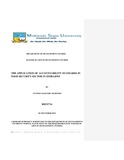Please use this identifier to cite or link to this item:
https://cris.library.msu.ac.zw//handle/11408/3985| Title: | The application of accountability standards in food security sector in Zimbabwe | Authors: | Madondo, Yvonne Makunde | Keywords: | accountability standards food security |
Issue Date: | Nov-2015 | Publisher: | Midlands State University | Abstract: | The Humanitarian sector is fast growing. As the world continues to experience an increase in natural disasters due to new threats such as global warming, as well as increased terrorist activity, which has seen the expansion of the role of humanitarian sector, humanitarian actors are also coming under close scrutiny due to their evolving role as the now primary care givers of populations, rather that the state, which has failed to cater to these needs. An increase in new contemporary problems has also seen an increase in the funds being dedicated to different causes. Therefore concern has been raised on the effectiveness and legitimacy of humanitarian actors, which has led to increased call for greater accountability by humanitarian actors. This research identifies the accountability standards that are used in food security programs, globally and in Zimbabwe as well. Similar research has been undertaken previously on overall application of accountability standards at a global scale, but no extensive research or academic study has been done on the application of these standards in the Zimbabwean context. This research therefore draws on the experiences and learnings of different accountability experts on what accountability standards are being applied, and how they have affected the Zimbabwe food security sector. The researcher also outlines the perceptions of the actual beneficiaries to see what communities themselves think about how NGOs are implementing accountability systems. Data analysis showed that the Zimbabwe NGO community is mainly focusing on only a few among the hundreds of different accountability standards that exist internationally. The research also highlights the challenges in application of accountability standards in Zimbabwe, such as inconsistencies in application not only between different agencies, but even within the same agency as well, financial constraints, and also the fact that beneficiary accountability seems to be lower on the donor priority list, which makes it less significant to project implementing NGOs as well. Given these findings, the research offers a number of recommendations, based on a change in organizational strategy, policy and culture, as well as responsibilities that should be taken up by bodies that bring together NGOs working in the Zimbabwean environment, to influence the uptake of accountability standards in Food security program. | URI: | http://hdl.handle.net/11408/3985 |
| Appears in Collections: | Master Of Arts In Development Studies |
Files in This Item:
| File | Description | Size | Format | |
|---|---|---|---|---|
| Yvonne Madondo R0331716 Masters Dissertation Final Draft 26 November 2015MM.pdf | Full Text | 1.58 MB | Adobe PDF |  View/Open |
Page view(s)
282
checked on Feb 4, 2026
Download(s)
148
checked on Feb 4, 2026
Google ScholarTM
Check
Items in MSUIR are protected by copyright, with all rights reserved, unless otherwise indicated.



